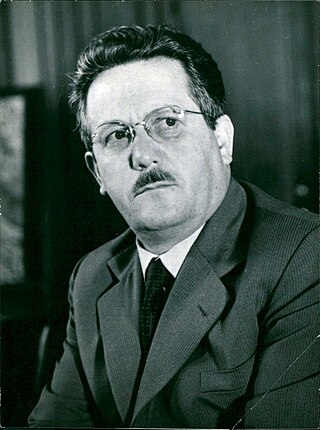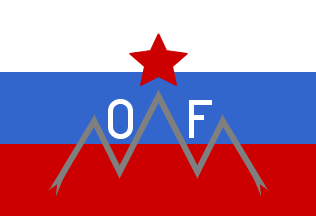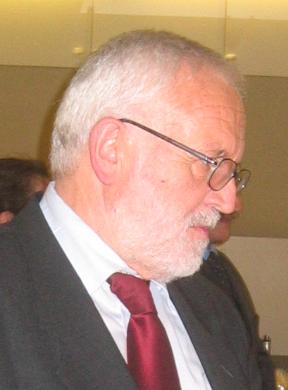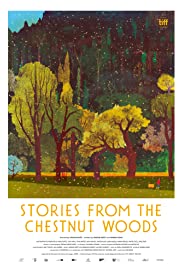
Edvard Kardelj, also known by the pseudonyms Bevc, Sperans, and Krištof, was a Yugoslav politician and economist. He was one of the leading members of the Communist Party of Slovenia before World War II. During the war, Kardelj was one of the leaders of the Liberation Front of the Slovenian People and a Slovene Partisan. After the war, he was a federal political leader in the Socialist Federal Republic of Yugoslavia. He led the Yugoslav delegation in peace talks with Italy over the border dispute in the Julian March.

The Liberation Front of the Slovene Nation, or simply Liberation Front, originally called the Anti-Imperialist Front, was a Slovene anti-fascist political party. The Anti-Imperialist Front had ideological ties to the Soviet Union in its fight against the imperialistic tendencies of the United States and the United Kingdom, and it was led by the Communist Party of Slovenia. In May 1941, weeks into the German occupation of Yugoslavia, in the first wartime issue of the illegal newspaper Slovenski poročevalec, members of the organization criticized the German regime and described Germans as imperialists. They started raising money for a liberation fund via the second issue of the newspaper published on 8 June 1941. When Germany attacked the Soviet Union, the Anti-Imperialist Front was formally renamed and became the main anti-fascist Slovene civil resistance and political organization under the guidance and control of the Slovene communists. It was active in the Slovene Lands during World War II. Its military arm was the Slovene Partisans. The organisation was established in the Province of Ljubljana on 26 April 1941 in the house of the literary critic Josip Vidmar. Its leaders were Boris Kidrič and Edvard Kardelj.

Zoran Janković is a Slovenian businessman and politician serving as Mayor of Ljubljana since April 2012. He previously served as mayor from 2006 to 2011.

Dejan Prešiček is a Slovenian saxophonist and politician.
Beneath Her Window is a 2003 Slovenian film directed by Metod Pevec starring Polona Juh. It was Slovenia's submission to the 77th Academy Awards for the Academy Award for Best Foreign Language Film, but was not accepted as a nominee. The movie won several awards at Slovenian Film Festival.
Polona Juh is a Slovenian actress. She is the daughter of the Slovenian actors Mojca Ribič and Boris Juh. After finishing her studies at High School for Ballet, she entered to study acting at the Academy for Theatre, Radio, Film and Television, where she graduated. Since 1995, she is a permanent member of Slovenian National Theatre Drama in Ljubljana.

František Čáp, also known as Franz Cap in Germany, was a Czech and later a Yugoslav film director and screenwriter. He directed 32 films between 1939 and 1970. Having created Slovene film classics such as Vesna, Ne čakaj na maj and Our Car, he is also one of the most popular directors of early Slovene cinema in 1950s and the 1960s.
See You in the Next War is a 1980 Yugoslav war film directed by Živojin Pavlović. It competed in the Un Certain Regard section at the 1982 Cannes Film Festival.

The architecture of Slovenia has a long, rich and diverse history.

Jože Mencinger was a Slovenian lawyer, economist, and politician.

Radko Polič was a Slovenian theatre, television and film actor.

Goran Vojnović is a Slovenian writer, screenwriter and film director. He is best known for his 2008 novel Southern Scum Go Home which won him numerous awards as well as a lawsuit filed by the Slovenian Police that was withdrawn a day later after media attention and public outrage at police filing charges for a work of fiction brought embarrassment to the Slovenian Ministry of Interior.

The Party of Alenka Bratušek was a political party in Slovenia. The party was formed from a split from Positive Slovenia in May 2014, and merged into the Freedom Movement in June 2022. The party participated in both the Bratušek and Šarec governments.
Jernej Šugman was a prominent Slovenian theater, television and film actor.

Consequences is a 2018 Slovenian drama film directed by Darko Štante. Billed as the first LGBT-related film ever made in Slovenia, the film stars Matej Zemljič as Andrej, a troubled teenager who is sentenced to a stint in a youth detention center following a series of petty crimes, and finds himself sexually and romantically attracted to Željko, the tough and charismatic self-appointed group leader of the boys in the center.

Bishop Metod Pirih was a Slovenian Roman Catholic prelate who served as the second Bishop of the Diocese of Koper from 16 April 1987 until his retirement on 26 May 2012. Before he was a Coadjutor Bishop of the same Diocese since 25 March 1985 until 16 April 1987.

Stories from the Chestnut Woods is a 2019 Slovenian drama, Gregor Božič's feature debut. It premiered at the 2019 Toronto International Film Festival (TIFF) in September 2019 and was selected as the Slovenian entry for the Best International Feature Film at the 93rd Academy Awards, but it was not nominated.
Jože P. Damijan is a Slovenian economist and politician.
Events in the year 2021 in Slovenia. The year was marked by the continuation of the COVID-19 pandemic in Slovenia.
The Festival of Slovenian Film Portorož is an annual film festival held in Portorož, Slovenia, dedicated to Slovenian cinema and television productions.













